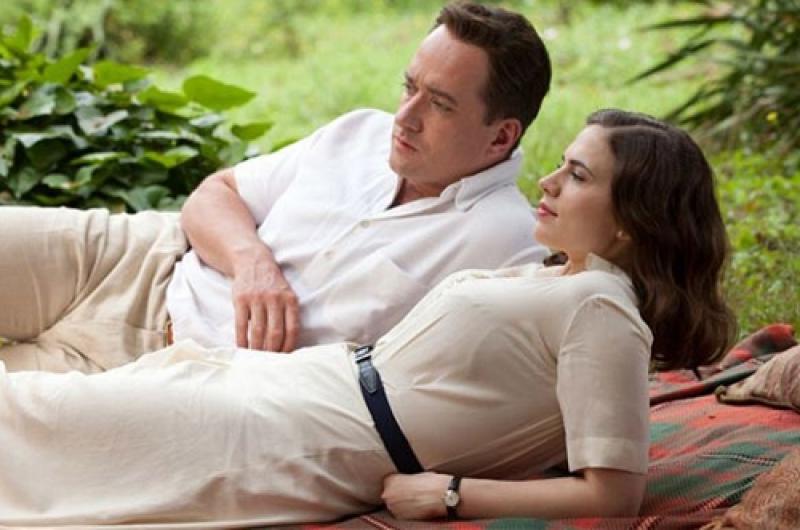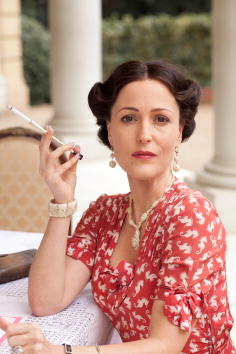Any Human Heart, Channel 4 | reviews, news & interviews
Any Human Heart, Channel 4
Any Human Heart, Channel 4
A long, strange trip for Logan Mountstuart in this William Boyd adaptation

Any period drama that crops up on Sunday nights is now automatically billed as a potential replacement for Downton Abbey. Any Human Heart has duly been described thus, but isn't.
I haven't read Boyd's novel, but I'm sensing that chopping and bending it into shape for television may not have done it too many favours. Constructing a kind of subjective biography from Mountstuart's copious journals, as the elderly Mountstuart (Jim Broadbent) looks back over his life after learning he suffers from heart disease, may be a fruitful literary ploy, but when boxed in by the specifics of time, place and appearance demanded by television, the space for imaginative playfulness is diminished.
Perhaps having three Logan Mountstuarts is a literal reflection of the "multiplicity of self" theme, but you can't miss the resounding jolt when one actor suddenly turns into a different one. It helps when the incoming one is Matthew Macfadyen, whose middle-aged Mountstuart is far more sympathetic than his brittle and supercilious younger incarnation (Sam Claflin) who we see plotting feverishly to lose his virginity while at Oxford in the mid-1920s, but it's a bad sign when the director has to smuggle in a quick flashback shot of the younger man to remind us who we're looking at.
Also, the nature of the piece leaves it at the mercy of history's nodal points, as its characters pinball around the timeline of real-life events which underpins the story like a subway map. Hmm, it's 1929 - it must be time for the Wall Street Crash. Sure enough, we see Mountstuart's widowed mother being schmoozed by a dodgy financial adviser who sings the praises of investing in American stocks. Next thing you know, Mrs Mountstuart has lost everything in the maelstrom of suicidal stockbrokers. Before the end of episode one, we were receiving baleful warnings of rising German anti-semitism, and the closing credits left us with Logan on a train bound for the Spanish Civil War, where there was good money to be made as a war correspondent.
 You begin to wonder if Logan is a pseudonym for Zelig. When he travels to Paris to meet his university friend Been Leeping (James Musgrave), he finds himself drinking absinthe with a wildly unconvincing Ernest Hemingway in a bar full of writers, with Hemingway insisting that he send him a copy of his novel. He's introduced to future James Bond creator Ian Fleming (more of whom in future episodes), and chivalrously steps aside on a Biarritz golf course to allow the Prince of Wales (a tongue-in-cheek Tom Hollander) and Wallis Simpson (coolly impersonated by Gillian Anderson, pictured right) to "play through", as golfers call it. I shan't be surprised if future episodes find our equivocal and promiscuous hero standing on the grassy knoll in Dallas or onstage at Live Aid.
You begin to wonder if Logan is a pseudonym for Zelig. When he travels to Paris to meet his university friend Been Leeping (James Musgrave), he finds himself drinking absinthe with a wildly unconvincing Ernest Hemingway in a bar full of writers, with Hemingway insisting that he send him a copy of his novel. He's introduced to future James Bond creator Ian Fleming (more of whom in future episodes), and chivalrously steps aside on a Biarritz golf course to allow the Prince of Wales (a tongue-in-cheek Tom Hollander) and Wallis Simpson (coolly impersonated by Gillian Anderson, pictured right) to "play through", as golfers call it. I shan't be surprised if future episodes find our equivocal and promiscuous hero standing on the grassy knoll in Dallas or onstage at Live Aid.
It's true that Logan likes to repeat his dead dad's aphorism about life being "just luck in the end", but all this happenstance and serendipity has a fatal effect on any seriousness the yarn was supposed to contain. Maybe they've saved it for later. And one other thing - why do we never see writers in films and TV programmes doing the hard slog of writing something?
Add comment
The future of Arts Journalism
You can stop theartsdesk.com closing!
We urgently need financing to survive. Our fundraising drive has thus far raised £49,000 but we need to reach £100,000 or we will be forced to close. Please contribute here: https://gofund.me/c3f6033d
And if you can forward this information to anyone who might assist, we’d be grateful.

Subscribe to theartsdesk.com
Thank you for continuing to read our work on theartsdesk.com. For unlimited access to every article in its entirety, including our archive of more than 15,000 pieces, we're asking for £5 per month or £40 per year. We feel it's a very good deal, and hope you do too.
To take a subscription now simply click here.
And if you're looking for that extra gift for a friend or family member, why not treat them to a theartsdesk.com gift subscription?
more TV
 Murder Before Evensong, Acorn TV review - death comes to the picturesque village of Champton
The Rev Richard Coles's sleuthing cleric hits the screen
Murder Before Evensong, Acorn TV review - death comes to the picturesque village of Champton
The Rev Richard Coles's sleuthing cleric hits the screen
 Black Rabbit, Netflix review - grime and punishment in New York City
Jude Law and Jason Bateman tread the thin line between love and hate
Black Rabbit, Netflix review - grime and punishment in New York City
Jude Law and Jason Bateman tread the thin line between love and hate
 The Hack, ITV review - plodding anatomy of twin UK scandals
Jack Thorne's skill can't disguise the bagginess of his double-headed material
The Hack, ITV review - plodding anatomy of twin UK scandals
Jack Thorne's skill can't disguise the bagginess of his double-headed material
 Slow Horses, Series 5, Apple TV+ review - terror, trauma and impeccable comic timing
Jackson Lamb's band of MI5 misfits continues to fascinate and amuse
Slow Horses, Series 5, Apple TV+ review - terror, trauma and impeccable comic timing
Jackson Lamb's band of MI5 misfits continues to fascinate and amuse
 Coldwater, ITV1 review - horror and black comedy in the Highlands
Superb cast lights up David Ireland's cunning thriller
Coldwater, ITV1 review - horror and black comedy in the Highlands
Superb cast lights up David Ireland's cunning thriller
 Blu-ray: The Sweeney - Series One
Influential and entertaining 1970s police drama, handsomely restored
Blu-ray: The Sweeney - Series One
Influential and entertaining 1970s police drama, handsomely restored
 I Fought the Law, ITVX review - how an 800-year-old law was challenged and changed
Sheridan Smith's raw performance dominates ITV's new docudrama about injustice
I Fought the Law, ITVX review - how an 800-year-old law was challenged and changed
Sheridan Smith's raw performance dominates ITV's new docudrama about injustice
 The Paper, Sky Max review - a spinoff of the US Office worth waiting 20 years for
Perfectly judged recycling of the original's key elements, with a star turn at its heart
The Paper, Sky Max review - a spinoff of the US Office worth waiting 20 years for
Perfectly judged recycling of the original's key elements, with a star turn at its heart
 The Guest, BBC One review - be careful what you wish for
A terrific Eve Myles stars in addictive Welsh mystery
The Guest, BBC One review - be careful what you wish for
A terrific Eve Myles stars in addictive Welsh mystery
 theartsdesk Q&A: Suranne Jones on 'Hostage', power pants and politics
The star and producer talks about taking on the role of Prime Minister, wearing high heels and living in the public eye
theartsdesk Q&A: Suranne Jones on 'Hostage', power pants and politics
The star and producer talks about taking on the role of Prime Minister, wearing high heels and living in the public eye
 King & Conqueror, BBC One review - not many kicks in 1066
Turgid medieval drama leaves viewers in the dark
King & Conqueror, BBC One review - not many kicks in 1066
Turgid medieval drama leaves viewers in the dark
 Hostage, Netflix review - entente not-too-cordiale
Suranne Jones and Julie Delpy cross swords in confused political drama
Hostage, Netflix review - entente not-too-cordiale
Suranne Jones and Julie Delpy cross swords in confused political drama

Comments
...
...
...
...
...
...
...
...
...
...
...
...
...